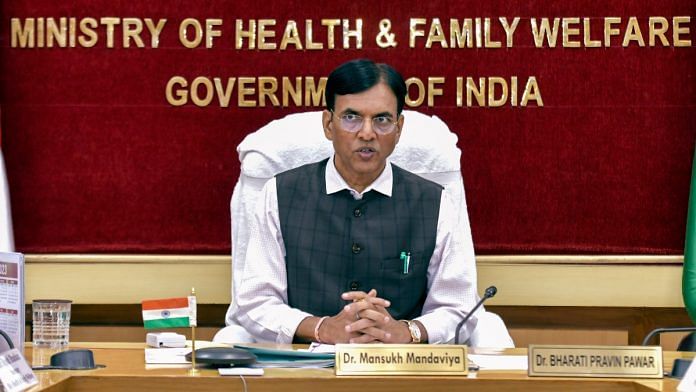New Delhi: Union Health Minister Mansukh Mandaviya Tuesday declared the government’s intent to strictly enforce Schedule M of the Drugs and Cosmetics Act, 1940, which deals with good manufacturing practices (GMP) for pharmaceutical manufacturing units, including specific requirements pertaining to premises, plant and equipment.
These practices, Mandaviya said, would be made “compulsory” for medium- and small-scale pharmaceutical companies in a phased manner to ensure the quality of drugs being produced in the country. “Schedule M shall be made compulsory for the MSME pharma sector in a phased manner. This will help in quality assurance and also reduce compliance burden,” a statement by the health ministry quoted the minister as saying.
He also underlined that “it is important for MSME pharma companies to be alert to quality of drugs and expeditiously move towards GMP through self-regulation”.
The statement followed a meeting between Mandaviya and representatives of the Indian Drug Manufacturers Association (IDMA) — an industry body with nearly a thousand medium- and small-scale drugmakers as its members.
ThePrint reached Health Secretary Rajesh Bhushan and a health ministry spokesperson via calls for comment but had not received a response by the time of publication. This report will be updated if and when a response is received.
“Schedule M has already been compulsory since 2005,” pointed out Chinu Srinivasan, co-convener of the All India Drug Action Network (AIDAN), hinting that its implementation is where authorities have been found lacking. AIDAN is an independent network of non-government organisations working to increase access and promote rational use of essential medicines.
Over the past year, instances involving the export of alleged adulterated cough syrups has prompted a serious discussion over the quality of drugs being produced in India.
One case involved the export of cough syrups by Haryana-based Maiden Pharmaceuticals to Gambia last year, which were then linked to the deaths of 89 children. Another involved export of alleged adulterated paediatric cough and fever syrups to Uzbekistan by Noida-based Marion Biotech.
In both cases, a joint inspection by the central and state drug authorities led to the discovery of gross GMP violations at manufacturing units operated by the firms in question.
Later, in response to concerns that the quality of drugs exported from India was not being adequately monitored, the government made a rule making it mandatory for all cough syrups being exported to be analysed at specified central laboratories.
The rule came into effect from 1 June.
Also Read: Inside India’s shadow pharma industry — dingy drug units, cash payments, poor inspection
‘Action against spurious drugmakers’
In Tuesday’s meeting with IDMA representatives, Mandaviya directed the Drugs Controller General of India (DCGI) to take stringent action against all pharmaceutical companies found guilty of manufacturing spurious drugs. “There shall be no compromise with the quality of drugs manufactured in India,” he emphasised.
Highlighting that the government has zero tolerance towards manufacturers not complying with quality standards, he added that special squads have been formed to inspect pharmaceutical manufacturing units.
As part of the exercise, which includes risk-based inspection and audit of plants, 137 firms were inspected and action taken against 105 firms over the last six months, according to details shared by the health ministry. This includes orders to 31 firms to halt production and cancellation/suspension of product licences in the case of at least 50 firms. In addition, show cause notices were issued to 73 firms, and warning letters to 21 others.
“Our global position in the pharmaceutical sector is created through the quality of our products. We must undertake all possible steps to ensure that we strengthen this position in terms of value and quality. Hence, the role of self regulation becomes critical,” the statement quoted the health minister as saying.
(Edited by Amrtansh Arora)
Also Read: Essential drugs have price caps, but most medical devices don’t. Now, govt working to change that



